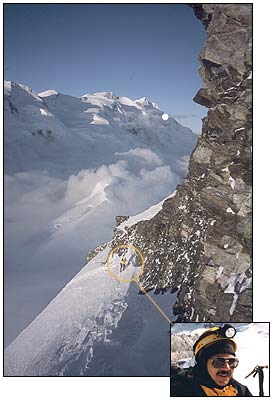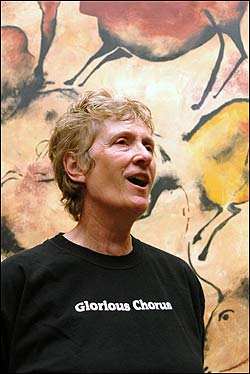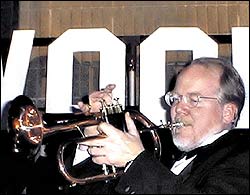UC Berkeley Web Feature

The secret lives of faculty, part 2:
Mountaineering, kite aerial photography and more
| Staffers with sidelines Know any UC Berkeley staff with far-out hobbies unrelated to their jobs? Send us a tip for a future story… |
BERKELEY – In the second of two installments about UC Berkeley faculty who juggle their academic interests with all-consuming hobbies, physics professor Alex Zettl tells why he likes climbing into thin air, Architecture's Cris Benton reveals how kites have taken him all over the world, Archaeology's Ruth Tringham sings the praises of the San Francisco Symphony, East Asian Languages' Mack Horton trumpets his love for jazz, and psychology professor Stephen E. Palmer proudly introduces his equine family.
Read the first installment: Faculty who dabble in racetrack betting, scuba diving, cop car collecting and more.
The Mountaineer
 Physics professor Alex Zettl climbing the north face of King Peak, in Yukon Territory on the Alaska/Canada border, with Mt. Logan in background. (Photo by John Locke) INSET: Zettl on Huascaran, in the Peruvian Andes. (A. Clare) |
name Alex Zettl
title Professor of Physics
hobby Mountaineering
is that like rock climbing? Not exactly - rock climbing is just one part of general mountaineering, which also includes ice climbing and mixed climbing (rock and snow). Zettl also does "expedition climbing," in which a team of climbers takes days or weeks to work its way up and down a mountain, ferrying supplies to higher and higher camps.
when started "When I was around 14. My dad used to do rock climbing, and he was interested in backpacking the Sierra Nevada with me, which was essentially in our own backyard. Then we did the Cascades, Mt. Rainier, moved to the Alps in Europe. It just slowly evolved into other countries. I've been on about 20 expeditions, in the Himalayas, both Pakistan and Nepal, near Mt. Everest; in South America; New Zealand; Africa; and lately, in Alaska."
time commitment "Many of the team members I go with are professional mountain guides; they do this year round. For their vacation, they do harder mountains with me. So I try not to get out of shape. I don't use elevators, ever; I'm constantly running up and down the stairs of the physics building's eight floors. A typical Alaska expedition climb will be about three weeks, climbing continuously on the mountain."
level of partner indulgence Puts up with it off and on, comes along on some trips.
what hobby offers that academia doesn't "I just love being outdoors - I also do whitewater kayaking and rafting as a river guide. Mountaineering and physics have parallel challenges. You need a plan of attack, you have to work out the logistics, and you don't know what you're going to find. Nature always has a surprise for you, in the lab or in the mountain."
pros "The vistas are fantastic; the areas are very pristine. Even mountains that are supposedly getting 'crowded' have more technical routes with nobody else on them where you can be alone for several weeks."
cons "Just about every time on a mountain, you'll experience avalanches coming down. You just try not to get hit. I've done solo climbing in the Andes, when you always worry about falling into crevasses. I've been in many situations where it gets a bit dicey, but you just have to stay calm. Also, you have to choose your partners wisely, as you'll know the first time you have to share a tent with a person in a storm for six days straight."
pet peeve "It seems like people in the Alps are getting rescued all the time. I don't think it's very smart to build that into your plan, that you'll just use a cell phone and call a helicopter if you get into trouble."
The Kite Aerial Photographer
 Architecture professor Cris Benton reclines for a self-portrait on a dry lake bed at Coyote Hills. INSET: With a camera rig in front of Golden Gate Bridge. (Photos courtesy Benton) |
name Charles "Cris" Benton
title Professor of Architecture
hobby Kite aerial photography (see his website)
when started "I was flying a radio-controlled sailplane at the Berkeley waterfront when a woman asked what radio frequency I was using. Since she didn't appear to have an airplane in her bag, I asked her why she needed to know - turns out she was a kite aerial photography enthusiast. I was intrigued, so I found what I could on the early, early Web, and built my first rig around Christmas 1994." He now uses a remote-controlled digital camera mounted on a kite.
degree of obsession "I'm notorious for becoming fickle with my interests, but this one has stuck - although I'm way, way behind on updating the website for it. During the semester, I rarely get out to photograph more often than Sundays, but it blossoms between semesters and over the summer."
goal "I'm so busy, and I enjoy this so much. Right now I'm just building a corpus of work; the time will come when I can organize it. A long-range goal is to publish or exhibit a big collection I have of images of Point Reyes, working with Golden Gate National Parks Conservancy."
most magical moment "The lovely thing is that I've had a bunch of them. I've enjoyed the desert photography a lot. I shot in Ivanpah Dry Lake on the California/Nevada border, where I was doing an art installation, and that was really fun, despite being 120 degrees. The Bay Area salt ponds were amazing. Burning Man."
worst moment "I dunked a camera in the water at China Camp State Park. I was flying a lightweight kite in a really low wind. I knew I was in tenuous circumstances so I started hauling the line in, but a family got in the way and I had to let it go."
what hobby offers that academia doesn't "Actually, kite aerial photography and architecture are very complementary. Architects think about bird's-eye perspectives and about the relationships between buildings in the landscape, so it's a natural segue. However, although I'm an architect by training, I've spent the last three decades working in building science, which is all technical. This has been a wonderful creative outlet for me. Also, I meet a whole different set of folks, people from all over the world, through doing the photography and the website. I've had all these intellectual adventures, such as serious conversations about flying kites on Mars and mapping the breathing patterns of manatees."
willingness to talk about hobby "At the drop of a hat. I find myself talking about it at women's clubs, at town and gown evenings, basically I'll take any invitation to talk about it anywhere."
chances of someday chucking career for it "I nurture fantasies about circling the equator, bartering these images for beer and lodging. I tested this idea in Hawaii, when a guy asked me if I would take pictures of some property for him in exchange for a house for a week. I could do photos of sailboats in action, that might work."
hobby is better than therapy because… "It's extraordinarily social. I've never done anything quite like it. When you're shooting, everyone out there wants to know what you're doing and thinks you're really cool."
The Singer
 Archaeologist Ruth Tringham has recorded numerous CDs with the San Francisco Chorus. (Bonnie Powell photo) |
name Ruth Tringham
title Professor of Anthropology (specializing in archaeology)
hobby Singing second alto for the San Francisco Symphony Chorus
when started singing "Music has always been a big part of my life. I played violin from age 9 all through high school in England; after that, I played guitar and sang folk songs - it was that time, you know. I started choral singing in Boston, and sang with the California Bach Society here. After a couple of years of lessons in sight reading and voice projection, I joined the Symphony Chorus in 1984, and I've been singing for it ever since."
hours per week "It can take up quite a lot of time when we're doing concerts, sometimes every night for three hours. It's at least three hours per week minimum. I usually do about five performances a year, which is basically a full program. The chorus's paid members - there are about 30 of them, versus 150 unpaid - have to do every performance, including smaller chamber work."
level of partner indulgence "My partner sings professionally, so there's a lot of music in our house."
achievements Has recorded several CDs with the symphony, including a Grammy Award-winning recording of Carl Orff's Carmina Burana with Herbert Blomstedt conducting.
most magical moment "We did Brahm's Requiem in 2001, right after September 11, and it was just exquisite. It brought tears to my eyes. Of course that also makes the voice go, but I've never felt anything like that."
most nerve-wracking moment "The symphony makes chorus members re-audition every other year."
what hobby offers that academia doesn't "The chorus is a great equalizer. And that's thrilling when you deal with students and the university hierarchy every day. I've also made good friends there who have nothing to do with the university, they have no idea what I do, and I like that."
chances of someday chucking career for it "Never. I know what professional singers have to go through and I wouldn't like to do that to myself."
better than therapy because… "It's like shouting therapy only with a beautiful sound. You're all in this together, making music, with the power of all those voices and the orchestral sound - it just gives me goosebumps. Sometimes before rehearsal I think, oh I'm too exhausted, but as I sing it rejuvenates me. I end up reenergized, all the stress gone. In a concert it's even more intense - usually after a concert I demand that someone take me out for a drink to calm down."
The Trumpeter
 East Asian languages professor Mack Horton playing flugelhorn with the Tollesons. (Photo courtesy Horton) |
name H. Mack Horton
title Professor and Chair, East Asian Languages and Cultures
hobby Jazz trumpet
level of commitment "Right now I play mostly straight ahead jazz and swing with whoever asks me. I play with lots of bands - the Japantown Band; Cynthia and the Swing Set; the Chabot Night Band, which has played at Yoshi's; and I play with the Tolleson Musical Organization, the Bay Area's main society band.
hours per week "I practice half an hour to an hour every day to keep my chops up. With trumpet, if you don't play for a day, it's obvious. It's very physical work. I play with bands two or three times a week."
when started "In the third grade, for the school band. They gave us a sheet of paper and asked us what we wanted to play. I said trumpet first, then clarinet, and instead they gave me a baritone horn, which is like a trombone. They said that my lips were too thick, instead of just admitting they were out of the trumpets. So my dad bought me one."
and then what happened? "As a teenager, I was considering music as a career. I toured one summer with "The Kids from Wisconsin," singers and dancers backed by a big band. We even opened for the Supremes at a state fair. During that summer I got so tired of touring, riding in the bus, setting up, practicing, playing, breaking down, and getting back on the bus. It was a killing pace if you didn't live for being on stage. I loved the music, but I could see I wasn't a theater kid like the others."
pros "I love soloing in big bands because I can play whatever I want. It's pure creativity, just as long as I follow the chord progressions, in contrast to playing in an orchestra, where you have to play exactly what's there. And if you do it right, the composer and the conductor get the credit, if you screw up you get the blame. In jazz, if you screw up a little you can pretend you meant it, you were just 'playing outside.'"
cons "The incidence of glaucoma among trumpet players is four times the national average, and there's more back pain. This physical pressure is intense."
what trumpet offers that academia doesn't "For me, it's a synergy. My specialty is Japanese linked verse, a medieval genre that was popular from 1200 to 1600. It's a dead art. In linked verse, seven or eight poets got together and linked one verse to the next for a hundred links. It was extemporaneous but it followed clear and complicated rules. Jazz shares the rule-based extemporaneity. When you're playing the chorus, it's wonderful to see how many social rules still apply: you defer to the other players, how many choruses you play depends on who's leading. You want to sound good, you want to show off your stuff, and yet you have to fit in. Both linked verse and jazz are shared artistic enterprises."
level of spousal indulgence "She's a classical music agent, so she's tolerant of the eccentricities of musicians and the late nights."
lesson learned "I'm very distressed to see school music programs being closed around the country, the funding for them evaporating. For me, starting an instrument that early, having it available in elementary school, made a huge difference. You can play sports for a while, but you can play music and continue to get better and better your whole life."
The Horse Breeder
 Psychology professor Stephen E. Palmer jumping Lady before he began breeding her. INSET: Ultimate Elegance, or "Ellie," Lady's one-month-old filly. (Photos courtesy Palmer) |
name Stephen E. Palmer
title Professor of Psychology
hobby Breeding, raising and jumping horses
when he started Began riding horses at camp around age 10, competed until college, stopped, and began riding again at age 48. Bought a Thoroughbred, Vigorous Gal (aka "Leading Lady" - her grandfather was Affirmed, the last Triple Crown winner) for his teenage daughter to ride, but ended up riding and showing her himself. In 1999 began breeding Lady for potential profit: is currently raising and training her four-year-old foal Windancer; the two-year-old filly Sophisticated Lady and one-year-old foal Chacone (both sired by Joe Montana's Holsteiner Chaka Khan); and a month-old filly called Ultimate Elegance.
hours per week "Depends on the time of year. They're cared for on a friend's ranch in Santa Rosa, so I try to get up there most weekends."
level of partner indulgence "No interest in the horses whatsoever."
achievements "I've got boxes of ribbons from shows and a fair number of trophies that I won on my mare, Lady, including the Metropolitan Horseman's Association English High Point Award. That was in 1998, the year we won the jumper championship in all four metropolitan shows."
proudest moment "Every time I see the new babies I fall in love. They're wonderful creatures, so amazing. They stand up and are walking around within the first hour or less of birth. My newest foal is just so incredibly elegant, even at a month old."
worst moment "When I watched my daughter fall off Lady."
what horses offer that academia doesn't "The kind of psychology I do is science, not therapy, so it's much more cerebral. Riding is about bodies and athleticism and motion. It's also about connection between you and the horse. I didn't realize how little I knew about horses as individual animals until I started breeding them. That's made me more in tune with their personalities and how different they are from each other, how they communicate."
goal "To get the breeding business figured out before I retire. My monthly bills are getting astronomical, what with training, stud fees, and vet bills."
horses are better than therapy because… "It takes you out of yourself. It's just you and the horse when you're riding: I never think about work, or my personal problems. I always sleep better at night the days that I ride."

